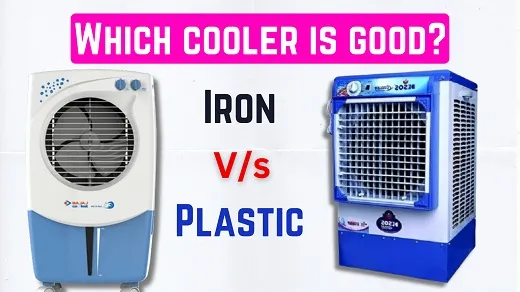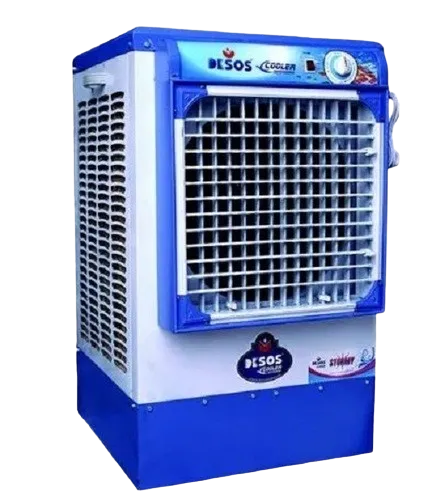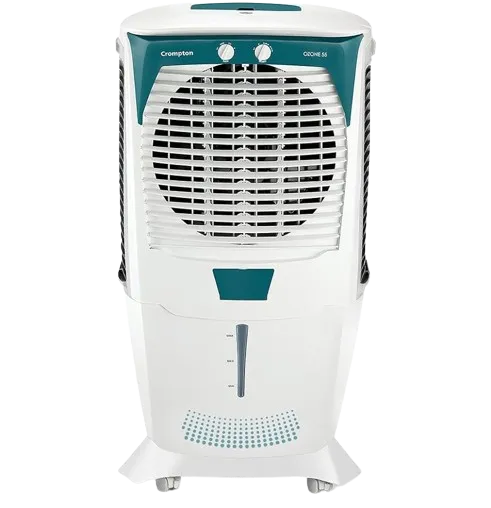Welcome to our comprehensive guide on the Iron or Plastic cooler? Which cooler gives cooler air, Which cooler is good?
Iron or Plastic Cooler? Which cooler gives cooler air? Which cooler is good?
Selecting the optimal cooler for your setting, whether it be your domicile, workplace, or any other locale, presents a critical choice between iron and plastic. The decision rests upon a thorough consideration of the attributes and drawbacks of each material to ensure an optimal cooling solution.

Which cooler is good for Home?
| Iron Cooler | Plastic Cooler |
|---|---|
| Made of metal, typically iron or steel | Made of plastic materials |
| Durable and sturdy construction | Lightweight construction |
| Better insulation properties, keeps contents cooler for longer | Less effective insulation |
| Heavier, more challenging to transport | Lighter, easier to carry |
| Often has a traditional or rustic appearance | Available in a variety of colors and styles |
| More suitable for outdoor use due to durability | More prone to wear and tear over time |
| Typically higher cost | Generally more affordable |
This table outlines the key differences between iron coolers and plastic coolers, covering aspects such as material, durability, insulation, weight, appearance, and cost. Which cooler is good for Home
- Top 10 Affordable Air Coolers
- Top 10 Front Load Washing Machines in India
- 10 Best Top Load Washing Machines in India
- 10 Best and Cheapest AC Price List in India

Endurance and Longevity
Iron Coolers
Iron coolers are esteemed for their robustness and enduring nature. Crafted from resilient substances such as cast iron or steel, these coolers withstand the trials of time admirably. Their resistance to rust and corrosion renders them particularly suitable for outdoor use or in environments characterized by high levels of humidity.
Plastic Coolers
Conversely, plastic coolers offer lightweight portability and often a more budget-friendly option compared to their iron counterparts. Nevertheless, their durability may falter, especially when subjected to inclement weather or frequent usage. Although some high-quality plastic coolers boast durability, they may not match the enduring quality of iron coolers. Which cooler is good for Home
Cooling Efficiency
Iron Coolers
Iron coolers are celebrated for their exceptional cooling capabilities. The dense composition adeptly retains cold air, ensuring a consistent and effective cooling experience. Moreover, numerous iron coolers incorporate adjustable vents or fan speeds, affording users the flexibility to tailor cooling according to their preferences.
Plastic Coolers

Although plastic coolers are lightweight and convenient for transport, they may not deliver the same level of cooling efficiency as iron coolers. The material’s inefficiency in retaining cold air can lead to less effective cooling, particularly in hot and humid conditions. Nonetheless, advancements in technology have yielded high-performance plastic coolers that rival their iron counterparts.
Energy Conservation
Iron Coolers
Thanks to their superior cooling prowess, iron coolers may prove more energy-efficient in the long haul. The adept retention of cold air reduces the workload on the cooler, resulting in decreased energy consumption and consequent cost savings over time.
Plastic Coolers
Despite their suboptimal cold air retention, plastic coolers can still achieve energy efficiency based on their design and features. Some plastic coolers offer energy-saving modes or programmable timers, enabling users to optimize energy utilization and curtail electricity expenses.
Environmental Considerations
Iron Coolers
Metal-based iron coolers may exert a greater environmental footprint compared to plastic counterparts. The manufacturing process typically demands more energy and resources, and the recyclability of iron coolers at the end of their lifespan may be less straightforward.
Plastic Coolers
Although plastic coolers face scrutiny for their environmental implications, they possess certain eco-friendly attributes. Many plastic coolers incorporate recycled materials into their construction, and some are engineered to be fully recyclable once they reach the end of their useful life.
Conclusion
In summary, the choice between iron and plastic coolers hinges on various factors including cooling efficiency, durability, energy conservation, and environmental impact. Ultimately, the optimal selection depends on individual requirements and preferences.
Those who prioritize durability and longevity may lean towards iron coolers, whereas individuals valuing portability and affordability may find plastic coolers more appealing. Regardless of the choice made, careful consideration of cooling performance, energy efficiency, and environmental considerations is paramount to making an informed decision.
best cooler for room cooling 5 star
FAQs regarding the selection of coolers: Iron or Plastic Cooler, Which cooler gives cooler air, Which cooler is good
A: When deciding between iron and plastic coolers, it’s essential to consider factors such as durability, cooling efficiency, energy consumption, and environmental impact. Evaluate your specific needs and preferences to determine which material best suits your requirements.
A: Iron coolers are generally considered more durable due to their construction from sturdy materials like cast iron or steel. They are resistant to rust and corrosion, making them suitable for prolonged use, particularly in outdoor or high-humidity environments.
A: Yes, plastic coolers are typically lighter in weight compared to iron coolers, making them easier to transport and maneuver. If portability is a primary concern, plastic coolers may be the preferred choice.
A: Iron coolers are known for their superior cooling performance as the dense material effectively retains cold air, ensuring a consistent and efficient cooling experience. However, advancements in technology have led to high-performance plastic coolers that can rival iron coolers in terms of cooling efficiency.
A: Iron coolers may be more energy-efficient in the long run due to their superior cooling capabilities, which reduce the need for the cooler to work as hard to maintain the desired temperature. However, some plastic coolers incorporate energy-saving features such as programmable timers to optimize energy usage.
A: Iron coolers may have a higher environmental impact due to the manufacturing process requiring more energy and resources. Additionally, iron coolers may be less recyclable at the end of their lifespan. Plastic coolers, while facing criticism for plastic pollution, can be more environmentally friendly if made from recycled materials and designed for recyclability.
A: The choice between iron and plastic coolers depends on your specific needs and priorities. If durability and longevity are paramount, an iron cooler may be the better option. However, if portability and affordability are key factors, a plastic cooler might be more suitable. Evaluate cooling performance, energy efficiency, and environmental impact to make an informed decision.
Thank You – Trustwelly.com
